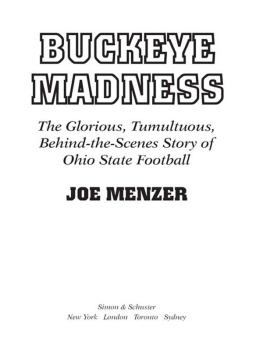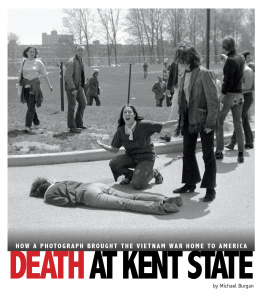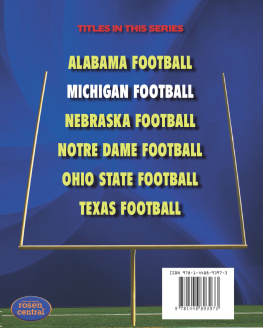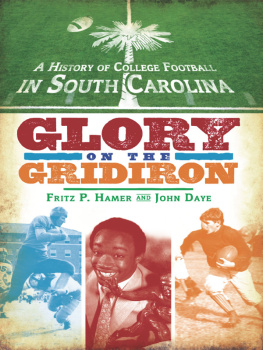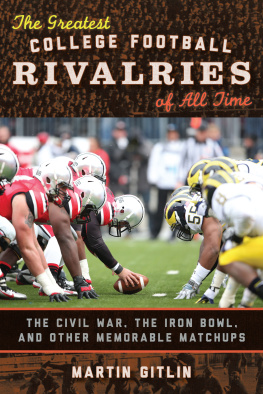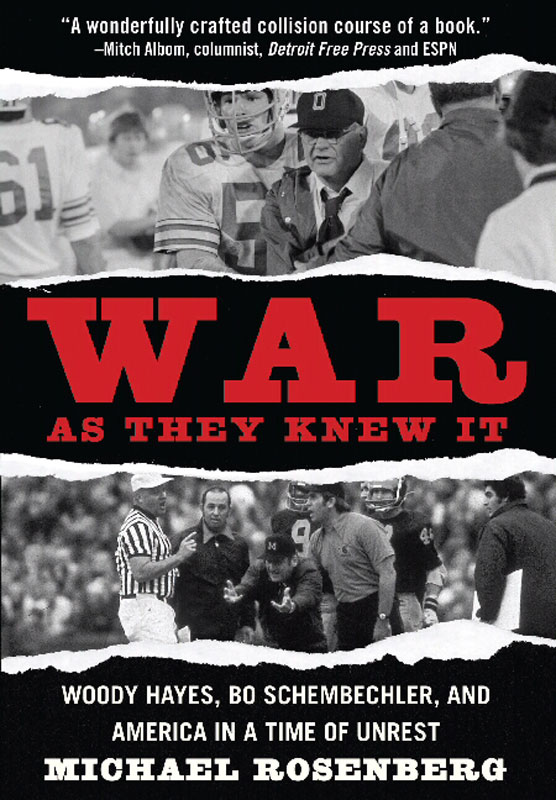Copyright 2008 by Michael Rosenberg
All rights reserved. Except as permitted under the U.S. Copyright Act of 1976, no part of this publication may be reproduced, distributed, or transmitted in any form or by any means, or stored in a database or retrieval system, without the prior written permission of the publisher.
Grand Central Publishing
Hachette Book Group USA
237 Park Avenue
New York, NY 10017
Visit our Web site at www.HachetteBookGroupUSA.com.
First eBook Edition: September 2008
ISBN: 978-0-446-54223-4
For Erin
Towards all this external evil, the man within the breast assumes a warlike attitude, and affirms his ability to cope single-handed with the infinite army of enemies. To this military attitude of the soul we give the name of Heroism.
Ralph Waldo Emerson, Heroism
What Kind of Game?
I t was time for Woody Hayes to adjust. Halftime, late October 1967: Hayess Ohio State Buckeyes trailed Illinois. Hayes stood at the locker room chalkboard, like any other football coach, to perform the most basic football-coach task: diagramming a play. And Hayes tried, he really did, but then he caught a glimpse of his fullback, Jim Otis, who had fumbled twice in the first half, and suddenly Hayes wanted to smack Otis.
Did it matter that Otis was one of Hayess favorite players? Or that Otiss father roomed with Hayes for two years at Denison University? Or that Hayes had known Otis for yearsand that Otis had spent his whole life preparing to play fullback for Woody at Ohio State?
Hell yes. Of course it mattered. With such close ties to Woody Hayes, Otis knew goddamn well not to fumble.
Hayes turned and rammed through the first two rows of players, then attacked with such force that Otiss Coke popped up in the air. And as he pounded away, Hayes screamed that Otis would never play for Ohio State again.
The Buckeyes had seen the flash of Hayess temper many times. Normally, there was a way to prepare for it: make him stand on your right side. Hayes was left-handed; when he stood on your right side, he had to take a step back to throw that left-fisted punch, and you had a chance to get out of the way.
But Otis, wedged into the third row, had nowhere to go, and at that moment, so much seemed to be ending. The season was lostOhio States record was about to fall to 23. There were rumblings that if Hayes lost the big season finale at Michigan, he would be fired. Otis, a sophomore, thought his career was finished (and in fact, he would be benched for the rest of that Illinois game and the two after that).
Had a picture been taken at that momentan image frozen and passed around the nation, designed to provoke an instant reactionmost people would have reached quick, obvious conclusions: Hayes and Otis would never speak again; the coach would lose the respect of his players; and the Woody Hayes era at Ohio State would probably end. Every conclusion would have made senseand every one would have been wrong.
Jim Otis never considered leaving Hayess program; his love for the coach only grew stronger over time. As for the other players, Hayes sometimes angered them, but he never lost them. His influence on them was overwhelming.
The sheer size of a football team limits individual interactions between the head coach and each player, but Hayes was so powerful in those moments that many Buckeyes would say he was like a second father to them. He insisted that they graduate, and when they did, he coaxed many of them to go to law school. Some players considered him so morally incorruptible that long after they left Ohio State, they feared disappointing him.
Hayes told his players that their closest friends in the world would always be their Ohio State teammates. That was true, but when those friends got together, they inevitably started talking about Hayes so much that they started to sound like him. Hayes had such a profound effect on his players that years after he died, they would often speak of him in the present tense: Woody has two rules: no drugs and no haters, they would say. Or: He is the best teacher. When he goes to the board in a classroom, he is magnificent.
And on the topic of endings: the Buckeyes would win their final four games of 1967, saving Hayess job. From there, they would put together one of the most dominant stretches in football history. And their excellence would trigger the greatest decade in the most storied rivalry in college football.
Nothing ended in that cramped locker room at Ohio Stadium. This was actually one of the great beginnings in the history of sports.
But the Buckeyes could not possibly know that at the time. They just knew the Old Man was pissed off again. And that somebody ought to detach him from Jim Otis.
One of Woodys assistant coaches, Hugh Hindman, pulled him off.
Bo Schembechler was lost in Ann Arbor, Michigan.
It was a snowy night in late December 1968, and Schembechler and his staff had piled into two cars in Oxford, Ohio, and headed north. They had left Miami University in Ohio for the University of Michigan, if only they could find it. Except for Schembechler and his defensive coordinator, Jim Young, none of the coaches had ever been to Ann Arbor. Now they were lost.
Where to go? Schembechler couldnt ask for directions to the schools football facility, because there wasnt one; the Wolverines had a dingy locker room tucked into a corner on the second floor of Yost Fieldhouse. The locker room had few toilets and poor ventilation; the resulting smell was so foul, players wanted to run out as soon as they could. But that was risky: the stairs outside the locker room were built for small men in loafers, not football players in cleats. When the players got downstairs, they had to go outside, through a parking lot, over a set of train tracks (or over couplings if there was a train stopped on the tracks), through another parking lot, and finally into Michigan Stadium, where they could begin practice.
Schembechler could have asked for directions to the national convention of Students for a Democratic Society, which was being held in Ann Arbor that week. SDS had been founded a few years earlier by Michigan alumnus Alan Haber and Michigan Daily editor Tom Hayden, and it had become the most powerful student organization in the country. As the Vietnam War became more unpopular, SDS grew in size and influence, and now it was about to crumble under its own weight, leaving splinter groups that favored more violent methods. (Haber had left Ann Arbor and SDS because there were too many factions pulling the organization in different directions.) But Schembechler, a thirty-nine-year-old footballaholic with a military buzz cut and very little interest in politics, surely didnt know about the convention.
If he got closer to campus, Schembechler could have listened for the strains of 2 + 2 = ?, one of the first anti-Vietnam rock n roll songs. Written by Ann Arbor native Bob Seger, it outsold the Beatles in local stores; it would be rereleased in the autumn of 1969, as Segers song gained resonance by the week.
But Schembechler was unlikely to listen to rock n roll, or a protest song, and especially a rock n roll protest song. Dissent did not sit well with the coach. (His new players would discover that quickly.)
Schembechler and his assistant coaches pulled over to a pay phone, called somebody from the athletic department, and finally found the campus. The university was on break, and because of a fuel shortage there was no heat in the campus buildings. The coaches had to meet Michigan athletic director Don Canham in the Pin Room of the Colonial Lanes bowling alley. Colonial Lanes was owned by Canhams friend Bob Ufer, who was broadcasting Michigan games on tiny WPAG in Ann Arbor.


